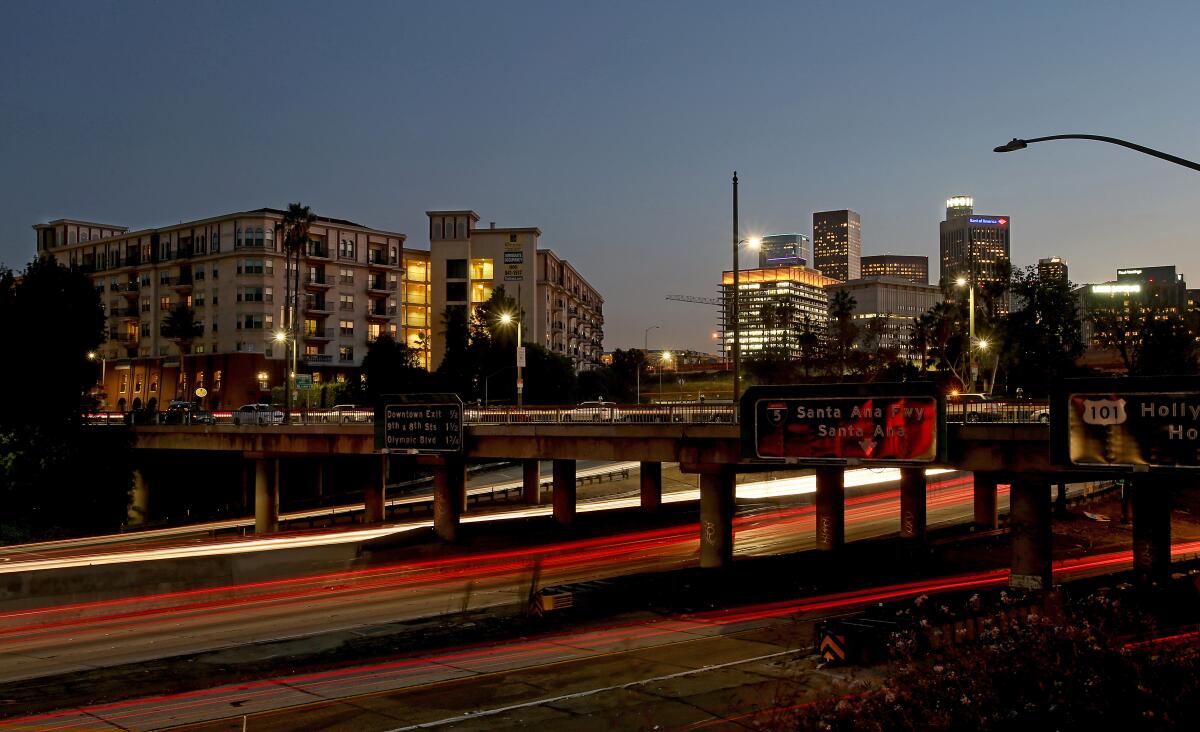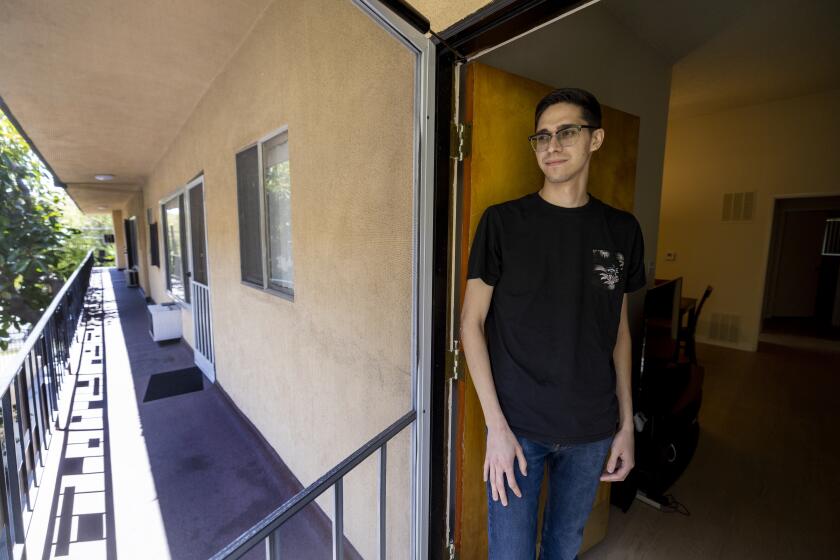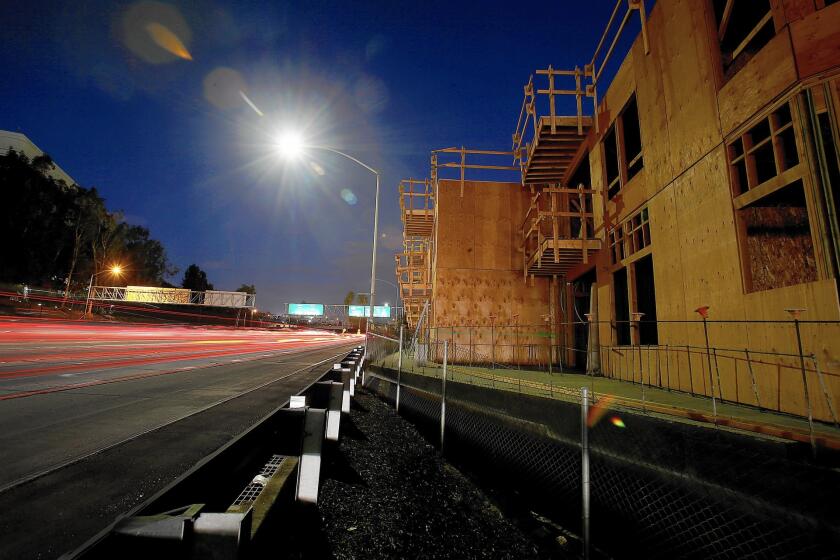They didn’t get their security deposits back. Now a big L.A. landlord agrees to pay $12.5 million

- Share via
Prominent Los Angeles landlord Geoffrey Palmer has agreed to pay $12.5 million to settle a class-action lawsuit accusing his company of withholding security deposits from more than 19,000 tenants when they moved out of his apartment complexes.
The proposed settlement, which goes before Los Angeles County Superior Court Judge Elihu M. Berle on July 18 for preliminary approval, could mark the end of a four-year legal battle that has pitted tenants against Palmer’s company, GHP Management Corp.
Court documents alleged the company — a subsidiary of G.H. Palmer Associates, one of the largest landlords in Southern California, with more than 15,000 apartments in 23 Southern California complexes — withheld security deposits for years from thousands of tenants by charging repair and cleaning fees without properly notifying residents.
California civil code dictates that landlords must disclose all repair and cleaning charges, as well as provide tenants with bills and invoices. Court documents allege that the company failed to send those notices, and in some cases, duplicated invoices to make it seem as if more were delivered than actually were.
Palmer is one of one of L.A.’s biggest landlords and a prominent donor to Republican causes. He also is no stranger to lawsuits and controversy.
The number of apartments available for rent in L.A. County is the lowest it’s been in two decades. The booming job market isn’t helping.
The developer is seen as a pioneer of downtown Los Angeles’ revival in 2001, building fortress-like faux-Italian apartment complexes in freeway-adjacent spots others had shunned. But along the way, he has antagonized design enthusiasts, neighborhood and tenant activists, city commissioners and some politicians.
Representatives of GHP Management and its attorneys did not respond to requests for comment on the proposed settlement, which was reached with the help of mediators.
“We are very pleased to have negotiated an outstanding resolution for over 19,000 former tenants ... whose security deposits were inappropriately handled over many years. The hard-fought settlement of $12.5 million will likely result in the full return of security deposits to former tenants dating all the way back to July 2014,” said Jimmie Davis Parker and Damion Robinson, attorneys representing the former residents in the class-action lawsuit, in a statement sent to The Times.
The pair called it “a resounding victory for tenants.”
Hector Ibarra, a retired officer with the Los Angeles Police Department, rented a one-bedroom apartment from GHP Management in Montclair from 2014 to 2015. When Ibarra, 61, moved out, the company withheld more than $1,000 of his security deposit, citing repairs and cleaning fees. Ibarra said he was shocked because he left the unit in great shape.
“It left a bad taste in my mouth,” he said. “I spoke to multiple people in the company at the time, but it fell on deaf ears, so I decided to not haggle over it. I’m glad they got caught.”
Ibarra added that a $500 payout “would be nice,” especially considering surging gas prices. For his former landlord, “I look on it as a slap on the wrist,” he said.
“Hopefully this sends a big enough message that next time, they’ll think twice about doing this,” Ibarra said.
A proposed settlement of a class action lawsuit against GHP Management over tenant security deposits.
The $12.5-million proposed settlement includes a $10-million cash payment for security deposits that were withheld. In addition, GHP Management will release former tenants from $2.5 million in claims covering things such as painting or carpet cleaning when they moved out.
The tenants suing GHP Management “believe that many of defendants’ move-out charges were bogus,” according to the preliminary approval motion filed with the court on June 1.
In addition, GHP Management agreed to “full compliance with the statutory disclosure requirements, providing future benefits to the tenants of over 15,000 residential units across Southern California,” according to the settlement approval motion.
The proposed settlement represents approximately 130% of class damages, meaning tenants will receive more than they were originally owed, court documents show.
Payments will be based on what each tenant was charged and probably will average $500 to $600 a person. The proposed settlement covers tenants starting July 13, 2014, the earliest date possible under the four-year legal limit from when the suit was filed.
Before rows of trendy restaurants and luxury residential towers became common in downtown Los Angeles, developer Geoffrey H.
Palmer has a hard-charging reputation, which is evident in his company’s legal and civic moves.
In August, GHP Management sued the city of L.A. over the COVID-19 eviction moratorium, claiming 12 buildings the company manages had lost more than $20 million as a result of the measure. The lawsuit is seeking $100 million in damages.
In 2014, Palmer drew the ire of pedestrian advocates after he requested an elevated bridge at the downtown Da Vinci apartment complex to help his tenants avoid a nearby homeless encampment. Despite those objections, the City Council approved the bridge.
In 2009, Palmer came under fire from housing activists after he persuaded a three-judge panel to strike down rules requiring developers near downtown to provide a specific percentage of affordable housing in their residential projects.
In 2003, Palmer infuriated then-Councilman Ed Reyes when his company tore down an 1887 Victorian house in Chinatown that preservationists had been looking to relocate. Palmer’s company countersued, arguing that the city had placed his client in an impossible position by ordering him to repair a nuisance property yet blocking him when he sought to raze it. The city ultimately settled.
The billionaire real estate developer donated more than $6.4 million to Donald Trump in the 2020 election cycle, and last year, he poured at least $1.2 million into efforts to recall California Gov. Gavin Newsom.
More to Read
Inside the business of entertainment
The Wide Shot brings you news, analysis and insights on everything from streaming wars to production — and what it all means for the future.
You may occasionally receive promotional content from the Los Angeles Times.













